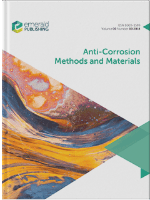
ANTI-CORROSION METHODS AND MATERIALS
Scope & Guideline
Advancing Knowledge in Anti-Corrosion Strategies
Introduction
Aims and Scopes
- Corrosion Inhibition Techniques:
The journal emphasizes research on various corrosion inhibitors, including organic and inorganic compounds, and their mechanisms of action to enhance the corrosion resistance of metals. - Advanced Coating Technologies:
A significant focus is on the development and evaluation of novel coatings, including nanocomposite coatings, superhydrophobic coatings, and self-healing coatings that offer superior protection against corrosion. - Electrochemical Studies:
The journal publishes studies involving electrochemical methods to analyze corrosion behavior, including impedance spectroscopy, noise analysis, and other electrochemical techniques. - Material Characterization:
Research on the characterization of materials and their microstructures is prevalent, aiming to understand how microstructural features influence corrosion resistance. - Environmental Effects on Corrosion:
The impact of environmental factors such as temperature, humidity, and chemical exposure on the corrosion behavior of materials is a key area of investigation. - Machine Learning and AI Applications:
The application of machine learning and AI to predict corrosion behavior and optimize corrosion protection strategies is increasingly featured, highlighting a modern approach to corrosion science.
Trending and Emerging
- Nanotechnology in Corrosion Protection:
There is a growing trend towards the use of nanomaterials and nanocomposite coatings, which offer enhanced protective properties and have shown promising results in corrosion resistance. - Sustainable and Eco-Friendly Corrosion Inhibitors:
Research on green corrosion inhibitors derived from natural sources is on the rise, reflecting a broader trend towards sustainability in material science. - Integration of AI and Machine Learning:
The integration of artificial intelligence and machine learning for predicting corrosion behavior and optimizing protective strategies is increasingly prominent, highlighting a technological shift in the field. - Self-Healing Coatings:
The development of self-healing coatings that can autonomously repair damage and maintain corrosion protection is a rapidly growing area of interest. - Corrosion in Additive Manufacturing:
As additive manufacturing becomes more prevalent, studies focusing on the corrosion behavior of 3D-printed materials and their protective measures are emerging as a significant theme.
Declining or Waning
- Traditional Corrosion Testing Methods:
There seems to be a waning interest in traditional corrosion testing methods, such as salt spray tests, as researchers increasingly adopt more sophisticated and predictive modeling approaches. - Basic Material Studies without Contextual Applications:
Papers focusing solely on basic studies of material properties without direct applications or implications for corrosion resistance are becoming less common, as the field moves towards more applied research. - Corrosion in Non-Industrial Settings:
Research on corrosion in non-industrial or less critical environments is declining in favor of studies focused on industrial applications, especially in sectors like oil and gas, marine, and aerospace.
Similar Journals
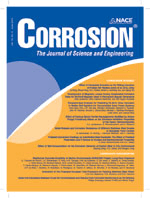
CORROSION
Exploring Corrosion Phenomena Across IndustriesCORROSION is a prestigious journal published by the Natal Association of Corrosion Engineers, dedicated to advancing the understanding of corrosion phenomena in various materials across multiple industries. With a strong commitment to high-quality research, it has established itself as a key resource in the fields of Chemical Engineering, Chemistry, and Materials Science, as reflected in its Q3 ranking in the 2023 category quartiles. This journal, retaining its relevance since 1969, serves as a platform for innovative studies and findings that address fundamental and applied aspects of corrosion, vital for professionals engaged in material selection and integrity management. Through access to state-of-the-art research, CORROSION significantly contributes to the safety, sustainability, and efficiency of engineering practices worldwide. Researchers, professionals, and students alike can benefit from the insights offered by this journal, driving forward the quest for innovative solutions in corrosion management.
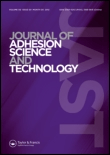
JOURNAL OF ADHESION SCIENCE AND TECHNOLOGY
Unveiling the Mechanics of Adhesion Technology.Journal of Adhesion Science and Technology is a distinguished publication within the fields of Chemistry, Materials Science, and Engineering, published by the reputable Taylor & Francis Ltd. Since its inception in 1987, the journal has been pivotal in advancing the understanding of adhesion mechanisms, technologies, and applications, boasting a conversion period extending to 2024. With a commendable impact factor and rankings placed in the Q2 category across various relevant domains, including Mechanics of Materials and Materials Chemistry, it offers a robust platform for scholars and practitioners alike. While currently not an open-access journal, it provides multiple access options, ensuring that vital research in adhesion science remains accessible to those dedicated to innovation and practical improvements in material interactions. This journal not only promotes empirical research but also encourages interdisciplinary collaboration, making it essential reading for researchers, industry professionals, and students eager to contribute to this dynamic field.
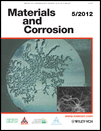
MATERIALS AND CORROSION-WERKSTOFFE UND KORROSION
Connecting Scholars to the Future of MaterialsMATERIALS AND CORROSION-WERKSTOFFE UND KORROSION, published by WILEY-V C H VERLAG GMBH, stands as a pivotal resource in the fields of materials science and engineering. Established in 1950, this peer-reviewed journal publishes innovative research that advances our understanding of materials performance and degradation in various environments. With a commendable impact factor and notable rankings in several categories—including Q2 in Materials Chemistry and Mechanical Engineering—the journal attracts submissions from leading researchers worldwide. It encompasses a diverse range of topics related to metals, alloys, surfaces, coatings, and environmental impacts, thereby serving a broad audience of scholars and professionals. The journal offers both subscription and Open Access options, ensuring that significant research findings are readily available to all. With its commitment to fostering knowledge and collaboration, MATERIALS AND CORROSION plays a crucial role in addressing the evolving challenges in material science and corrosion management.
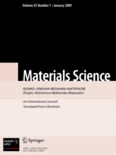
MATERIALS SCIENCE
Pioneering Discoveries in Condensed Matter Physics.MATERIALS SCIENCE, a prominent journal published by SPRINGER, serves as a vital resource for researchers, professionals, and students in the fields of materials science, mechanical engineering, and condensed matter physics. With its ISSN 1068-820X and E-ISSN 1573-885X, this journal has been dedicated to sharing innovative research since its inception in 1993, and it continues to publish groundbreaking findings through 2024. Although it operates as a traditional subscription-based journal, its ranking in the Q3 quartile across multiple scientific categories, including Condensed Matter Physics, Materials Science, Mechanical Engineering, and Mechanics of Materials, signifies its relevance and impact in the academic community. Notably, its Scopus classifications reveal a competitive standing among its peers, ranking within the 25th to 33rd percentiles across various engineering and physics disciplines. The journal remains a key platform for disseminating valuable insights, fostering collaboration, and advancing the understanding of materials science.
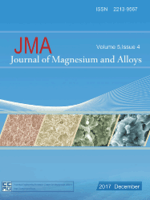
Journal of Magnesium and Alloys
Driving Research Directions in Magnesium ScienceThe Journal of Magnesium and Alloys is a prestigious, peer-reviewed academic publication dedicated to advancing the field of materials science, particularly focusing on magnesium and its alloys. Published by KEAI PUBLISHING LTD since 2013, this Open Access journal enables unrestricted dissemination of research findings, enhancing global collaboration among researchers, professionals, and students. With an ISSN of 2213-9567 and a significant impact factor, it has established itself in the upper quartiles (Q1) of both the Mechanics of Materials and Metals and Alloys categories, ranking #3 out of 176 and #9 out of 398 respectively according to Scopus. The journal aims to provide a forum for the latest advances in the understanding, production, and application of magnesium alloys, fostering innovation and sustainable practices within the materials engineering community. Based in Beijing, China, the journal is committed to bridging gaps in current knowledge and driving future research directions through its high-quality publications.

RUSSIAN JOURNAL OF ELECTROCHEMISTRY
Connecting Researchers with Cutting-Edge Electrochemical InsightsThe Russian Journal of Electrochemistry, published by Pleiades Publishing Inc, is a reputable scientific resource that caters to the dynamic field of electrochemistry. Since its inception in 1996, this journal has become a platform for the dissemination of cutting-edge research, exploring both foundational studies and innovative applications within electrochemical science. Despite currently holding a Q4 categorization in its field, the journal is dedicated to enhancing its scholarly impact and visibility, reflecting its commitment to fostering advancements in electrochemical technologies. With its ISSN 1023-1935 and E-ISSN 1608-3342, the journal strives to reach a global audience of researchers, professionals, and students alike. Though the journal is not open access, its contents are crucial for anyone looking to stay at the forefront of electrochemical research and developments. The journal's editorial board includes well-respected experts, ensuring that published articles contribute significantly to the scientific community and pave the way for future innovations in the field.
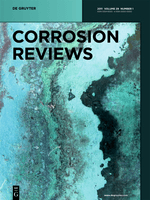
CORROSION REVIEWS
Advancing the Science of Corrosion ManagementCORROSION REVIEWS, published by WALTER DE GRUYTER GMBH in Germany, is a pivotal journal dedicated to advancing the understanding and management of corrosion phenomena across various fields including Chemical Engineering, Chemistry, and Materials Science. With an ISSN of 0334-6005 and an E-ISSN of 2191-0316, this esteemed journal has demonstrated an enduring commitment to scholarly excellence since its inception in 1979, encompassing comprehensive interdisciplinary research outputs and reviews. Ranked in the Q2 category across several disciplines for 2023, and positioned favorably in Scopus rankings—#94 in Chemical Engineering and #145 in Chemistry—it serves as an essential resource for researchers and professionals seeking to enhance their knowledge and application of corrosion science. While the journal does not currently offer open access, its rigorous peer-review process ensures high-quality, credible research publications that contribute significantly to the academic community's efforts in corrosion prevention and policy. Researchers, students, and industry professionals alike will find CORROSION REVIEWS an indispensable tool for staying at the forefront of this critical area of study.

Metals
Shaping the future of materials science through rigorous research.Metals is an esteemed open access journal published by MDPI, focusing on the diverse field of metallurgical science and its applications. Since its inception in 2011, the journal has provided a platform for the dissemination of high-quality research regarding the behavior, processing, and properties of metals and alloys. With an E-ISSN of 2075-4701, it has quickly established itself within the scientific community, achieving a remarkable Q1 ranking in the realm of Metals and Alloys and a Q2 rank in general Materials Science as of 2023. The journal is situated in Switzerland and is committed to the principles of open access, ensuring that findings are accessible to a broad audience without subscription barriers. With its notable impact factor and a strong emphasis on innovative research, Metals serves as an essential resource for researchers, professionals, and students seeking to advance their knowledge and understanding in the ever-evolving landscape of metallurgical studies.

Corrosion Science and Technology-Korea
Fostering collaboration in the realm of corrosion science.Corrosion Science and Technology-Korea, published by the CORROSION SCIENCE SOC KOREA, is a pivotal journal dedicated to the exploration and advancement of knowledge in corrosion science, particularly within the context of materials performance and maintenance. Established to foster innovation and collaboration among scholars in South Korea and beyond, this journal focuses on areas such as electrochemistry, metal alloys, and surface coatings, catering to a diverse audience of researchers, professionals, and students in materials science and chemistry. Despite its current quartile rankings, including Q4 in Electrochemistry and Q3 in various materials-related categories, the journal aims to enhance its visibility and impact in the scientific community by publishing high-quality research and reviews. With its ISSN 1598-6462 and E-ISSN 2288-6524, Corrosion Science and Technology-Korea is committed to contributing to the understanding and mitigation of corrosion issues, thereby promoting sustainability and longevity in engineering applications.

Protection of Metals and Physical Chemistry of Surfaces
Exploring the Frontiers of Metal Chemistry and Surface ScienceProtection of Metals and Physical Chemistry of Surfaces is a prominent academic journal published by MAIK NAUKA/INTERPERIODICA/SPRINGER, which provides a specialized platform for researchers and professionals in the fields of materials chemistry, metals and alloys, organic chemistry, as well as surfaces, coatings, and films. With an ISSN of 2070-2051 and an E-ISSN of 2070-206X, the journal is recognized for its rigorous peer-reviewed content and comprehensive coverage of innovative research addressing the latest advancements in material protection and surface chemistry. As of 2023, the journal has been categorized in the Q3 quartile across several relevant fields, highlighting its increasing influence within the scientific community. Although the journal is relatively niche, its open access model encourages wide dissemination of knowledge, fostering collaboration and advancements within its core disciplines. Research published in this journal plays a crucial role in not only enhancing theoretical understanding but also facilitating practical applications in various industries, thereby underlining its importance for students, researchers, and professionals alike.